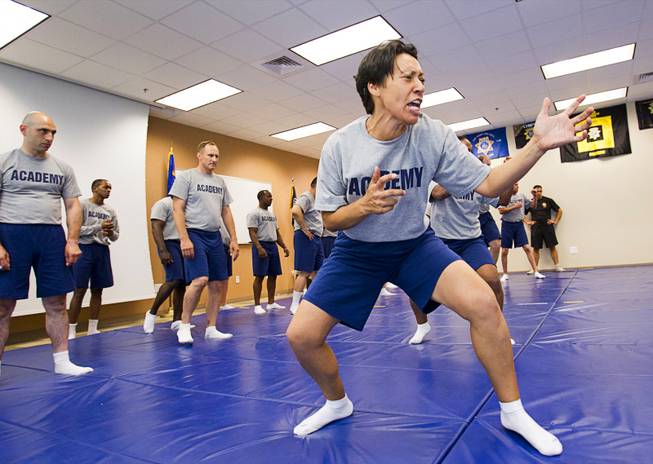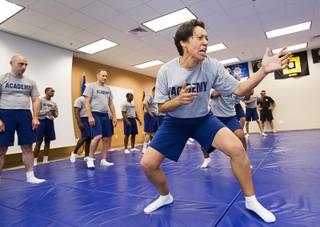
Recruit Bianca Morris, 39, works on a defensive drill during defensive training at the Metro Police Corrections Academy, Tuesday, June 12, 2012.
Wednesday, June 13, 2012 | 2 a.m.
Future officers reporting to the Metro Police Academy in July might not have much in common aside from a presumed desire to protect the public.
They’re former personal trainers, retail managers, construction workers and dental hygienists, to name a few — in other words, they’re from a cross-section of jobs in Las Vegas.
The employment backgrounds of the newest recruits, who on July 12 begin 22 weeks of training at the academy, differ from those who applied four or five years ago at the peak of the department’s hiring spree, said Lynne Jantz, Metro’s director of human resources.
“It used to be we’d have your security people, your prior law enforcement, your military and your athletes,” she said. “Now we’re getting people from every conceivable walk of life.”
Recruits to Metro’s Corrections Academy, which started earlier this month, come from an even wider array of previous careers, Jantz said. The current academy consists of a former bartender, teacher, loan officer, salesman, mail carrier, valet parker and freight worker, among others.
The varied careers exist in drastically smaller recruiting classes, though. In 2007, Metro tested 8,674 people for the Police Academy alone. Of those applicants, 1,592 people made it onto the eligibility lists, which feed the academies, Jantz said.
“We exhausted those lists in multiple academies,” she said.
Then the tide turned in Las Vegas as the economy tanked, ending the city’s boom era. Metro’s recruiting budget didn’t escape the collapse.
The department didn’t even offer a Corrections Academy in 2010, Jantz said. In 2011, Metro only offered testing on five days, leading to 2,045 applicants and 298 people landing on eligibility lists, Jantz said. The department trimmed testing because there will be a maximum of two academies for police officers this year.
“The demand is great,” Jantz said. “Our patrol force is a bit depleted, and we definitely need bodies, but we also know this might be the last chance to have an academy for a while because of budget cuts.”
When the department was able to hire in the past two years, Jantz said Metro recruited more Hispanic and black police and corrections officers.
The department’s scaled-back recruiting efforts could explain the increases in diversity. Metro used to cast a wider recruiting net during the city’s massive growth days, making trips to the Midwest, Southern California and New York, which typically attracted more white men, Jantz said.
Now, about 75 percent of recruits in the academies are from Las Vegas, which has a more diverse population, Jantz said.
“We feel we have an obligation to hire Las Vegas people whenever we can because that supports our own community,” she said.
Despite the presence of military personnel in Southern Nevada, however, Jantz said the number of applicants with a military background has been at an all-time low the past two years in Las Vegas.
The department has not determined what’s driving the decrease — which bucks a national trend — but officials expect to see applicants with military experience start inching back up in the next year or two as more veterans return home.
Many law enforcement agencies across the country are reporting more applications from military personnel, said John Firman, director of research for the International Association of Chiefs of Police. He cautioned against reading too much into Las Vegas’ decrease in that category.
“Applicants are always going to be different by the nature of your (locality),” he said. “It’s never going to be identical across 18,000 agencies.”
The eclectic employment history of applicants, however, does reflect a broader national effort to attract candidates from various walks of life, Firman said. A grant from the Justice Department helps fund discoverpolicing.org, a website marketing the benefits of law enforcement careers.
Public safety leaders jokingly call the website “the eHarmony of policing” because it’s designed to mesh applicants with suitable agencies and jobs nationwide, Firman said.
The down economy has certainly helped that effort, he said.
“People are looking for good, reliable, steady jobs,” he said. “(Policing) is a government position.”
Firman said the varied backgrounds typically benefit departments, as long as candidates are screened with a bit more of a discerning eye.
“You have to make sure it’s a reasonable switch,” he said. “Why is someone going from one career to another?”
Firman said his son, a computer engineer turned police officer, is an example of a complementary career shift.
“He brought some technical skills and expertise to the department,” Firman said.
Jantz said Metro seeks certain must-have qualities in all candidates — strong communication and interpersonal skills, for instance — but it’s embracing the new, diverse applicant pool.
“I think it’s a huge assistance because law enforcement itself is changing,” she said. “It’s not like it used to be where you just take people to jail. ... Today, it’s about partnering with the community.”


Join the Discussion:
Check this out for a full explanation of our conversion to the LiveFyre commenting system and instructions on how to sign up for an account.
Full comments policy